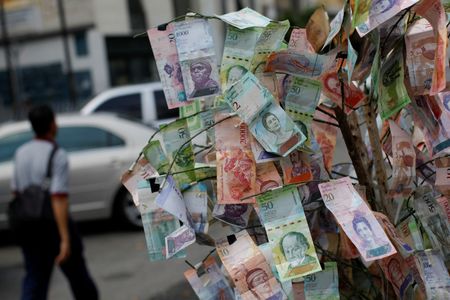CARACAS (Reuters) – Venezuela’s down-at-the-heel bolivar currency fell to 20 per dollar, according to official data for Wednesday, complicating attempts by the government of President Nicolas Maduro to control inflation.
The bolivar has depreciated 14% this month, said analysts, who have estimated that the economy could return to hyperinflation this year amid incipient economic growth.
Consumer prices were 37.2% higher in December than in November, according to estimates by the Venezuelan Finance Observatory, a non-governmental group of economists, which predicts annual inflation for 2022 will hit 305%.
The central bank has not published inflation data since October.
“It is now clearer that there is a new inflation spiral coming because of the jump in the exchange rate without an economic program,” said economist Jose Guerra.
Inflation was contained in the single digits for nine months last year as the government tamped it down with orthodox measures, such as credit and spending limitations and tax increases.
But the strategy is showing cracks as prices increase and public sectors workers – who last got a salary rise in March 2022 – protest for better wages.
The monthly minimum wage in Venezuela is now equivalent to $6.50.
Maduro said in December he was preparing strict measures against bolivar depreciation, but he has yet to announce any.
Local consulting firm Sintesis Financiera says control of the exchange rate would require higher weekly injections of dollars into the financial system, which would be difficult amid reduced oil income.
(Reporting by Mayela Armas; Writing by Julia Symmes Cobb; Editing by Bradley Perrett)

